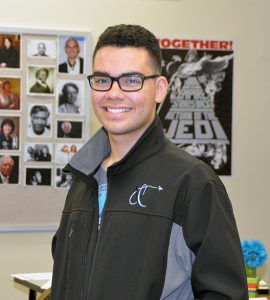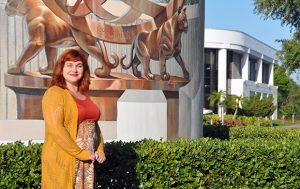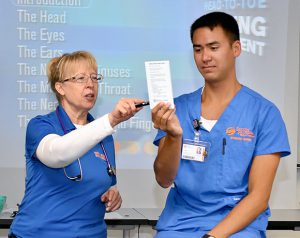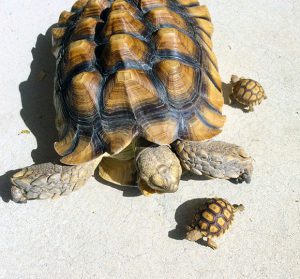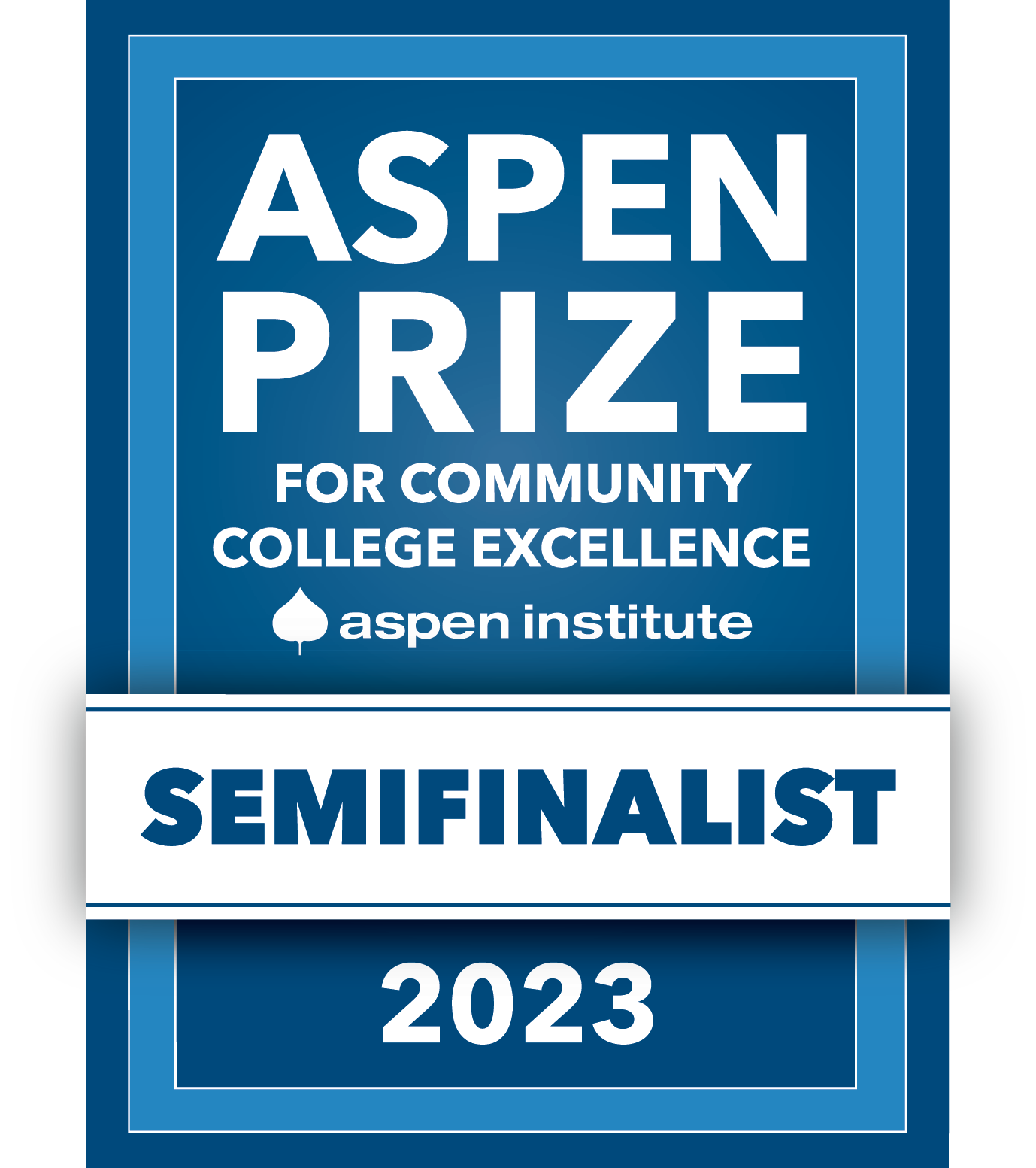 South Florida State College Awarded $500,000 to Create Mobile Welding Lab
South Florida State College Awarded $500,000 to Create Mobile Welding Lab
AVON PARK, FL – April 26, 2018 – South Florida State College (SFSC) was awarded $500,000 through a special funding allocation by the Florida legislature to create a mobile welding lab that will provide low-cost, high-demand workforce training to the residents of DeSoto, Hardee, and Highlands counties.
“The governor’s budget was titled ‘Securing Florida’s Future’ and that’s exactly what this special funding initiative does for our region,” said Dr. Thomas C. Leitzel, president of SFSC. “Welding is a core skill for various jobs and industry sectors. We’re thrilled to be able to offer this specialized training in an innovative and convenient delivery method for the residents of our district. Bringing the classroom to our students for short-term training makes sense. SFSC is extremely grateful to Senator Denise Grimsley and Representative Ben Albritton, who both sponsored the legislation that led this important funding initiative through their respective chambers.”
With no formal welding training programs available in Florida’s rural heartland region, this mobile welding lab has the potential to train more than 150 students annually and offer short-term training options with significant income and earning potential to the tri-county region.
“South Florida State College is excited to have the opportunity to expand technical training opportunities throughout our service area,” said Dr. Sidney E. Valentine Jr., vice president for academic affairs and student services at SFSC. “The addition of the mobile welding lab will allow SFSC to not only reach students at our four campuses, but also area high schools and industry locations throughout the region. This training will vary in length from degree, certificate, and diploma programs to just-in-time workforce development training through SFSC’s Corporate and Community Education Department.”
Welding is one of the most in-demand workforce skills with 3.4 percent annual growth in the heartland region and an estimated 800 welders needed annually in central Florida. According to CareerSource Florida, trained welders can earn a starting salary of $17 per hour with a possible future salary of $30 per hour, or $60,000 annually, which is more than the average salary for someone who possesses a vocational certificate.
“We are eager to support the needs of businesses in our service district with a mobile welding lab,” said Erik N. Christensen, dean of applied sciences and technology at SFSC. “The new welding program will greatly complement many of the programs currently offered and help satisfy a need with our local employers. Virtually every company has a need for welding—some businesses need full-time welders while others may just need one of their employees to be able to weld as the need arises. The mobile lab will enable us to provide the right training anywhere, anytime.”
The lab will be housed in a large trailer with both simulator and live-welding units. Trainers and equipment will be included to facilitate arc welding (MIG, TIG, and Stick Welding). The lab will continuously travel throughout the tri-county region, as needed.
With a pool of trained welders available locally, DeSoto, Hardee, and Highlands counties will be positioned to attract new employers and industry leaders to the region.
For more information about the mobile welding lab, email Erik Christensen at 863-784-7424.
About South Florida State College
South Florida State College (SFSC) is a comprehensive, open-access, higher education institution dedicated to providing a student-centered environment focused on learning and personal enrichment through quality programs and services. At its campuses in DeSoto, Hardee, and Highlands counties and through its online presence, the College offers certificates, associate degrees, and bachelor’s degrees that lead to the continued success of its graduates and a variety of opportunities for the educational, cultural, and economic advancement of the service district. SFSC is one of the 28 institutions of the Florida College System.
The SFSC Museum of Florida Art and Culture (MOFAC) presents “Little Slices of Heaven on U.S. 27,” May 16 through June 15, on the SFSC Highlands Campus in Avon Park. A Third Thursday Reception, featuring the exhibition and participating artists, will be held on Thursday, May 17, 1 p.m., at MOFAC. This exhibition is funded in part by a grant through the Endowment for the Arts.
“Little Slices of Heaven on U.S. 27” features destinations and attractions which existed from 1934 to 1970. It is a visual road trip through bygone Florida via photos, videos, memorabilia, artifacts, and fine art on loan by Florida artists as well as art and historical institutions.
This traveling exhibition focuses on the unique tourist attractions that developed following the construction of U.S. Highway 27. The highway runs almost 500 miles down the middle of the state from Tallahassee to Miami. Nicknamed the “Backbone of Florida,” U.S. Highway 27 served as the state’s principal highway before the construction of Interstates 4 and 75 and brought new visitors to Florida’s less traveled areas. This led not only to an increased appreciation and ultimate preservation of Florida’s natural wonders, but it also spurred the development of several creative, educational, and witty delights up and down the stretch. The exhibition also covers the Tin Can Travelers, visitors who traveled throughout Florida during the 1920s, prior to the construction of U.S. Highway 27.
“Florida has held a creative and quirky appeal, bringing visitors into our state for decades,” said Megan Stepe, MOFAC curator. “This exhibition celebrates many of the parks and roadside attractions which delighted visitors and helped shape our state’s tourist identity. It honors, as well, the road which helped to make it all possible.”
Some of the destinations and attractions included in the exhibition are Wakulla Springs State Park, Silver Springs, Cypress Gardens, Highlands Hammock State Park, Bok Tower Gardens, Sebring International Raceway, Tom Gaskins Cypress Knee Museum, Pirate’s World, Monkey Jungle, as well as hotels, motor lodges, diners, and welcome stations along the way.
Artists participating in this exhibition have contributed work which either refers to the attractions specifically or emphasizes them indirectly. They are Richard Reep, Shannon Cummings, Johanna O’Donnell, Carl Knickerbocker, Curtis Nelson, and Cindy Rose Eaton.
MOFAC is located in the Alan Jay Wildstein Center for the Performing Arts at SFSC, 600 W. College Dr., Avon Park. The museum is open to the public on Wednesday, Thursday, and Friday, 12:30 – 4:30 p.m., or by appointment for group tours.
For more information about MOFAC and its programs or to request a museum tour, contact Stepe at 863-784-7240, or email stepem@southflorida.edu. Visit the MOFAC website at mofac.org.
Luis Rodriguez will approach the podium as student speaker during South Florida State College’s (SFSC) 7:45 p.m. Commencement ceremony on Thursday, May 3, at the Highlands Campus in Avon Park. He recently turned age 18 and will receive his vocational certificate in applied cybersecurity. This will be his second certificate from SFSC. In December 2016, he earned a college credit certificate in network security.
“Commencement is the beginning of a new life, a new you,” he said. “You come to college as one person, and you walk out as a whole other person. You have a sense of accomplishment and pride. It gives you a sense of meaning and worth.”
But Rodriguez’s academic life is not over yet. On May 19, he graduates from Sebring High School. Further, he is only three courses shy of earning his Associate in Science degree in network security, which he plans to complete this summer.
College, for Rodriguez, began with the Highlands Career Institute (HCI) at SFSC. Through the HCI, high school students earn a high school diploma while working toward an occupational certificate or earn college credit. Students spend half a day taking high school classes and the second half of the day in college classes alongside adult college students on the SFSC Highlands Campus. By the time they graduate from high school, most students have earned an occupational certificate and are ready to enter the workforce or continue on a career pathway at a college or university. Because HCI is considered dual enrollment, costs are waived for tuition and books.
“I knew that I wasn’t going through college without financial assistance,” Rodriguez said. “So, coming to HCI at SFSC gave me a head start with no out-of-pocket costs. My mother had earned a degree, and I saw how she had student loans. She just recently paid them off.”
Even at a young age, Rodriguez has his future planned. “Right now, my goal is to become a penetration tester, which is a hacker that companies hire to audit their networks,” he said. “They purposely break their network systems to strengthen them and make them more secure. They use the same tools as an attacker.”
Eventually, he would like to enlist in the U.S. Coast Guard. “They’re starting a cybersecurity and intelligence division,” he said. “You get training and your education is paid for. Besides, I find the idea of fighting pirates really cool.”
Another possible route within the Coast Guard Rodriguez has considered is to fly helicopters. “I want to go into Information Technology (IT) and enlist in officer candidate school. Then, I want to be a helicopter pilot. I don’t know if that’s going to exactly work, but that’s how I see it in my head. In the Coast Guard, you have to be an officer to be a pilot.”
In the meantime, Rodriguez is working toward his pilot’s license. A volunteer spot during the U.S. Sport Aviation Expo at the Sebring Airport nurtured his childhood dream of becoming a pilot. “I volunteered to help set up and take things down during the Expo,” he said. “I became mesmerized by the atmosphere and got bitten by the aviation bug.”
Rodriguez, eventually, got a job at the airport and hopes to become a lineman shortly. “They’re in charge of the ramp. They take care of everything outside of the terminal, everything that has to do with the runway and planes. They take care of overall maintenance of the runway, so there’s no damage to the planes.”
“Flying was a childhood dream of mine,” Rodriguez said. “Becoming a pilot requires 40 hours of flight time. I now have 20 hours. To earn your pilot’s license, you also have to take a three-part exam and I’m cramming for the written portion now. I anticipate being done in June or July. It’s a great feeling to make your dream real. If I could talk to myself as a child right now, I’d high five myself.”
“I didn’t think I’d make it in college,” Rodriguez said of his experience at SFSC. “The stigma that college is hard and you’ll be staying up late hours of the night, only some of it’s true. The reason why some people don’t succeed is because they don’t have the self-discipline. If you go into it with the mindset that you won’t do well, then you won’t. After I told myself not to think that way, college became an easier experience. But college is not only about academics, it’s about making new friends, connections, and getting in touch with professionals in their industries.”
“I had the pleasure of having Luis in many of my courses over the past three years,” said Brian Bohlman, professor of computer networking technology at SFSC. “From the first day of class, Luis impressed me with his willingness to tackle difficult concepts and curriculum with a true ‘can-do’ attitude. Luis is a talented individual and natural leader who has my highest respect and encouragement toward his future studies and his cybersecurity career. Luis is going to do great things, and I will surely be following his progress closely.”
Young explorers who have completed kindergarten through grade five can discover a world of careers through fun activities at South Florida State College’s (SFSC) Camp Adventure 2018.
Camp activities teach children about the world through supervised activities and games, and includes swimming in the afternoons. The annual summer camp will be in session June 11-July 27 at the SFSC Highlands Campus in Avon Park. Children can attend all six weeks or any week of their choice. There will be no camp the week of July 4.
The cost to attend a weekly session, Monday through Friday, is $157 and includes breakfast and lunch. Camp sessions run 8 a.m.-5 p.m. each day, with early drop-off beginning at 7:30 a.m. and pick-ups continuing through 5:30 p.m.
Campers are accepted on a first-come, first-served basis. For further information and an application, call 784-7388 or visit southflorida.edu/campadventure.
During the first week, June 11-15, campers will “train” to learn fun facts and trivia in preparation for Camp Adventure’s first ever game show, “Are You Smarter than a Camper?” The competition pits campers again SFSC employees.
During Week 2, “Mad Scientists,” June 18-22, campers learn about famous scientists, perform science experiments, explore space, and take a trip to a science museum.
Week 3, “Explore Art and Express Yourself,” June 25-29, campers will tour SFSC’s Art Department and the Museum of Florida Art and Culture (MOFAC) and take part in art projects to learn basics and express themselves.
During Week 4, “Playing with Your Food,” July 9-13, campers learn about agriculture and Future Farmers of America (FFA), experience the meaning of “farm to table,” and go on a field trip to a farm and dairy.
Week 5, “Snack Attack,” July 16-20, is all about food. Campers will make treats and snacks throughout the week, while learning the importance of good health and nutrition.
Week 6, July 23-27, is “That’s A Wrap, Let’s Celebrate!” As camp comes to an end, campers will don wacky outfits throughout the week and participate in wacky games. On Friday, they will participate in a sundae bar and pizza party.
Erika Weaver-Coleman graduates with an Associate in Arts degree from SFSC at the Spring Commencement on Thursday, May 3. Although she will tell you that she struggled through high school, this mother of four children will be the speaker at the 4:45 p.m. Commencement ceremony.
Originally from Opelika, Ala., Weaver-Coleman’s early life was unsettled. Her father was a manager in the furniture business and transferred to new work locations several times. “I went to nine different high schools between 1995 and 1999,” Weaver-Coleman said. “The moving around was difficult.” Between the constant movement and the death of her beloved grandfather, she became depressed.
“I had difficulty in high school,” she said. “So, I started going on a search for myself. I traveled a lot—to Arizona, New Orleans, London, New York, and Amsterdam.” She took a job at Six Flags Over Georgia. “I was part of their Halloween event, Fright Fest, where I played the Bride of Frankenstein. Later, I played Raggedy Ann in a clown house and popped out of a jack-in-the-box.”
While at Six Flags Over Georgia, she met members of a traveling performance art group and joined them on tour. She performed as a fire breather and, occasionally, laid on a bed of nails while a mime did a handstand above her.
“Through that period of my life, I wanted to know, ‘How do other people live? How do I fit into all of this?’” she said. “My mother always told me to get out of myself. I carried that with me. Looking back, that’s what took me from this dark place to figuring out who I was.”
But Weaver-Coleman’s calling was inside her the whole time. Early on, she wanted to be a teacher. As a child, she’d played school with her dolls in her grandparents’ basement. “My uncles on my mother’s side of the family had all studied engineering at Auburn University,” she said. “Even though I didn’t understand what was in them, I used their textbooks to “teach” my toys. And I spent my allowance money on teacher supplies and decorations for my classroom.”
Weaver-Coleman married, had four children, and later divorced. “Before I remarried, I realized that as a single mother, I wanted a better life for myself and family. But the opportunities you have are limited. I worked in elder care. It was exhausting, and I didn’t earn enough to take care of a family. For me, I didn’t feel that it was my destiny. I needed a livable income. I knew that there was a better life for me and it meant I needed to follow through with my dream of becoming a teacher. I want to live a life that helps the world, make a livable income, and be fully present with my family.”
Weaver-Coleman eventually applied to SFSC with her eye to earning a Bachelor of Science in Elementary Education. Initially, she sought assistance through the Student Support Services/TRIO program. TRIO is a federally funded program for first-generation students, low-income students, or those with a documented disability. “I’m a first-generation college student,” Weaver-Coleman said. “With the TRIO program, I can go to any of the advisors and talk with them about personal or academic concerns. They helped me select classes and set goals.”
In her first semester, Weaver-Coleman discovered the Phi Theta Kappa (PTK) honor society and decided she wanted to be a member. After speaking with Dr. Sonji Nicholas, the SFSC PTK advisor, Weaver-Coleman made sure she met the membership requirements. “I fell in love with it and the opportunities it offers. Through PTK, I learned how to be a successful student and successful person.”
In fact, Weaver-Coleman has gained recognition through PTK. She was recently named one of six SFSC students to the 2018 All-Florida Academic Team for academic achievement, leadership, and service to the community. She was also selected as a 2018 Coca-Cola Academic Team Bronze Scholar, receiving a $1,000 scholarship. As one of seven students selected internationally, she received the $1,000 Oberndorf Lifeline to Completion Scholarship that assists PTK members overcome unanticipated barriers to completion of an academic degree. Weaver-Coleman used the much needed funds to repair her home after damage from Hurricane Irma.
Although she has a long list of favorite professors at SFSC, Weaver-Coleman doesn’t hesitate to say that Dr. Sonji Nicholas, sociology professor, is her mentor. “I took Dr. Nicholas’ sociology class my first term in school, before she became my PTK advisor. I go to her office at least once a week. I can tell her how things are going and get advice from her. She’s always encouraging even if she has a lot on her plate. She’s like, ‘Everything is going to be OK.’”
“As a student in my sociology class and as a member of PTK, Erika positively distinguished herself to me as an insightful, knowledgeable, creative, and service-oriented leader with superior ability to analyze problems and formulate solutions,” Dr. Nicholas said. “It is wonderful to see that others see these and other fine attributes that she possesses, as evidenced by the many forms of recognition she has received throughout the year. It has been my great pleasure to get to know Erika and to help her to navigate various aspects of college life while simultaneously planning for the bright future she is destined to realize. I continue to be proud of her well-earned accomplishments.”
“I never imagined that I’d get into college, let alone participate in my first Commencement,” Weaver-Coleman said. “It’s a point of arriving, even though I’m not at the academic end of my destination. It fulfills a promise to myself and my family. I can, certainly, reflect on how far I’ve come.”
South Florida State College (SFSC) will host a free half-day, two-week STEM Summer Camp for high school students. The camp will take place June 18 – 29, 8:30 a.m. – 12:30 p.m. at the Highlands Campus in Avon Park.
“The purpose of the STEM Camp is to provide high school students with the opportunity to enhance their math skills, especially if they aspire to study STEM after graduation and pursue a corresponding career,” said Elizabeth Andrews, Activity Coordinator and professor of English at SFSC. “Campers will receive direct instruction and also have the unique ability to be hands on in SFSC’s new mechatronics lab which includes a variety of robotics equipment, 3D printers, and industry-specific systems. And, this is all at no cost to the campers and their families.”
With the push for more science, technology, engineering, and math study in schools across the nation, this camp will allow campers to practice the fundamentals of math that lead to more advanced application essential to science, technology, and engineering careers. Campers will also travel to the Museum of Science and Industry (MOSI) in Tampa to see the practical and real-world applications of higher mathematics.
This summer camp is free and open to all high school students who are going into their sophomore, junior or senior year, especially Hispanic and low-income applicants. All campers are responsible for providing their own transportation to and from campus. Breakfast and lunch will be provided.
Students can register online at southflorida.edu/stem-summer-camp. For more information, contact Tasha Morales, director for Re-Engineering Our Future at SFSC, at 863-784-7401 or moralest@southflorida.edu.
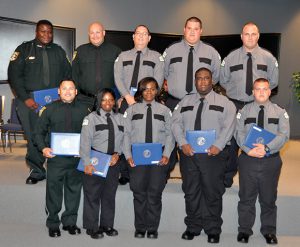 SFSC graduated 10 new corrections officers during the evening Basic Corrections, Class 18-195, ceremony at the SFSC University Center Auditorium on the Highlands Campus on Wednesday, April 18.
SFSC graduated 10 new corrections officers during the evening Basic Corrections, Class 18-195, ceremony at the SFSC University Center Auditorium on the Highlands Campus on Wednesday, April 18.
Michael Austin, coordinator at SFSC’s Criminal Justice Academy, presented each graduate with their occupational certificate. Recipients were Joshua Almack, Shane B. Berini, Rupert C. Brown, Danielle T. Carter, Deckita R. Cowell, Eduardo Lebron, Dakota L. Linder, Robert Martinez, Nikola Pavlovski, and Kanisha Peterson.
Four students were singled out for their achievements during the 420 hours of instruction. Shane B. Berini earned top honors for academic excellence and Eduardo Lebron scored the firearms award for his work on the shooting range. Kanisha Peterson was lauded for her work as class executive officer and Danielle T. Carter was praised for stepping up to take on the demanding job as class leader.
Speaker LaKisha Collins, senior correctional probation officer with the Florida Department of Corrections, addressed the graduates. “Each of you are now subject to constantly being viewed with a fine tooth comb,” she said. “Never take action based on emotion. Remember, not all actions deserve a reaction. What you do will have lifelong consequences to the clients and inmates you deal with on a daily basis. Don’t ever get complacent. This is an exciting career with many pitfalls and stumbling blocks. Learn what to avoid. Seek out motivated co-workers as mentors. You’re class motto is: United, We are One,” she said. “It defines each of you perfectly. Always be inquisitive, suspicious, and thorough.”
In closing, Collins said to the graduates, “Take time to remember your family members. They were there for you before you started the academy, they were there by your side while you attended, and they’re going to be there long after you put up your duty belts. Find time for your family.”
Dawn Pisarski, professor of nursing at SFSC and nurse practitioner, wanted to be a veterinarian. But after 30 years as a practicing nurse and nearly nine years with the college, it appears that there’s no going back and that’s OK.
At SFSC, she teaches pharmacology, nutrition, and medical-surgical nursing, and she’s earned a reputation at the college for her special interest in nutrition. In fact, she recently contributed the chapter, “Nutritive Value of Complementary Therapies for Oral Care” for the textbook, “Nutrition for Dental Health,” Third Edition.
According to Pisarski, her curiosity about nutrition started on a farm in the hamlet of Gasport, New York, between Niagara Falls and Rochester, on Lake Ontario.
Pisarski’s family had a dairy farm and she loved animals. “Taking care of the calves is where I first got interested in natural health and in nutrition. I would watch the calves as they grew and noticed that some of them looked and grew better than others. That really sparked my interest in nutrition.”
She also grew up with gardening. “My mother had a large garden,” she said. “We canned and froze everything from the garden. That fed the family for an entire year. We made butter and baked bread every Saturday. Everything was homemade.”
When Pisarski was considering her future after high school, her mother encouraged her to become a nurse. “She always wanted to be one,” Pisarski said. “But I wanted to be a veterinarian. When I was looking at veterinary schools and the cost and time involved, my dad said, ‘No, find something different.’”
After graduating from high school, Pisarski got married and had children. “The first year that I was married, my husband became very ill and was close to death,” she said. “He was in the hospital for five weeks and in the intensive care unit (ICU) for three weeks. When I was in the ICU with him, I watched the nurses work and decided, ‘This is what I want to do.’”
She waited until her children were in school before she enrolled in a nursing program. Shortly after graduating, she was hired as a nurse in the ICU of a local hospital. Over the next 20 years, she became certified to teach vocational technical education and biology, and earned her master’s degree.
In that time, Pisarski and her husband had a farm while raising their children. She worked as a part-time school nurse, part-time at a hospital, and held various other part-time jobs. “I cleaned house or made pies for a restaurant,” she said. A part-time job at the nearby Board of Cooperative Educational Services (BOCES), eventually, became full-time and lasted 15 years. BOCES is a public organization that provides shared educational services and programs, such as career and technical education, to school districts. At the local BOCES, she taught vocational education in health occupations, nurse assisting, and practical nursing programs.
In 2005, Pisarski became a nurse practitioner to embrace her passion for prevention. “I just thought that was a good level in nursing to initiate prevention and do a lot of teaching,” she said. “I feel like many diseases can be prevented and that our diet makes a big difference. So that brings me back to nutrition. We can prevent diabetes, we can prevent heart disease. There are a lot of diseases that we can prevent or we can slow them down or have them start later. If you can get 10 good years of health before disease sets in, that’s great.”
According to the Florida Association of Nurse Practitioners, nurse practitioners in Florida work under the supervision of a physician, hold master’s or doctoral degrees, “manage and provide primary and acute care, diagnose illness, prescribe tests and medications, and promote health and wellness.”
“As a nurse practitioner, assessment skills have to be very acute,” Pisarski said. “I have that sixth sense. I got that from working with animals when I was younger. You have to be able to put pieces together and make a diagnosis on a patient. You have to be knowledgeable about the medications that are going to take care of a concern.”
Pisarski has been a professor of nursing at SFSC since 2009. When teaching students, she considers nutrition important in patient care. “They’re going to be taking care of patients. Teaching pharmacology and nutrition go hand in hand because some foods interact with medications. For example, patients need to be aware that drinking milk when they’re taking certain medications will bind with the medication and they won’t get the full benefit of the medication. In addition, many herbals are blood thinning, so if a person is on blood thinners, they’re going to get over-treated,” she said. “Some examples of blood thinning herbals are ginger, garlic, ginseng, glucosamine, to name a few.”
“I teach students the importance of an egg,” she said. “Chickens are fed calcium, and that’s what makes that shell hard. When you eat a hard-boiled egg, the calcium from the shell leaches into the egg. So you’re going to get a little more calcium than if you were just to eat a cracked egg.”
Pisarski tells students that the egg is the perfect protein and explains by telling the story about a prisoner of war (POW) who was in prison for a year. “All the POW was given to eat was one hard-boiled egg and water every day,” she said. “When he was released and came back to the United States, it was anticipated that he’d be malnourished, but he wasn’t. He was expected to have vitamin and mineral deficiencies, but there weren’t any.”
In addition to teaching at SFSC, Pisarski serves as chair on the board of the Samaritan’s Touch Care Center in Sebring and does volunteer community service as a nurse practitioner at the center.
“Samaritan’s Touch is a clinic for the indigent,” she said. “Oftentimes, they don’t have health insurance because they don’t have jobs or they have low-paying jobs, and they’re looking for alternatives. Many of the clients don’t want to take medications and want to know, ‘What do I have at home that I can use?’ There are things at home that can be used right out of your kitchen cupboard for illnesses.”
“Everyone at some point will get a cold or flu, which are viruses,” Pisarski said. “Many of our foods are anti-viral, such as garlic and onion. They have anti-bacterial properties as well.”
For years, chicken soup has been known for soothing cold and flu symptoms. “When you cook the chicken with the bone, it extracts anti-bacterial properties from the bone,” Pisarski said. “If you add your garlic and onion to the soup, you get better faster.”
In her personal life, Pisarski cares for her three tortoises: Mort, who is 8 years old and Elek and Chester, who are around 18 months old. “Years ago, a friend introduced me to tortoises,” she said. “I didn’t know anything about tortoises, so I did my research. Then, I fell in love with them.” She has raised tortoises for 20 years, primarily Sulcatas, or African Spurred Tortoises. Because Sulcatas are from the southern edge of the Sahara Desert in Africa, they spend their lives on land. “They don’t drink water,” Pisarski said. “They absorb water through their shells, so they have to be soaked with water on a regular basis. They’ll hold onto that fluid like a camel does and go weeks without water. Plus, they’re vegetarians, which makes them easy to care for.”
In spite of Pisarski’s years of dedication to nursing, she clearly hasn’t left her love of animals behind. Perhaps, a bit of the veterinarian still lies within her.
SFSC is offering a non-credit nursing assistant program at its Hardee Campus in Bowling Green, beginning Monday, May 7.
This program consists of two separate courses for a total of 165 hours: a 90-hour Introduction to Healthcare course (CRN 30791) that begins on Monday, May 7, and a 75-hour Nursing Assistant course (CRN 30775) that begins Tuesday, June 12. Students will need to meet the entry requirement of a four-hour American Heart Association Basic Life Support for Healthcare Providers course before entering the nursing assistant course.
“Nursing assistants touch people’s lives in meaningful ways every day,” said Mary von Merveldt, director of nursing education at SFSC. “They provide essential care that supports the nursing team and best outcomes for patients which is vital to the health of our community.”
Nursing assistants can be employed in a variety of health care settings, such as outpatient clinics, hospitals, and long-term care facilities. A nursing assistant works under the supervision of a licensed practical nurse or registered nurse and may assist with personal care; patient mobility; activities associated with nutrition and hydration; maintaining safe patient environments; and collecting basic patient data. It is an entry-level nursing option that may assist students in career exploration or future academic endeavors.
The nursing assistant program at SFSC will also provide the information and skills practice necessary to build knowledge and attain confidence that will help students be successful in taking the Florida Nursing Assistant Certification examination, if they so choose.
To register for these courses, visit the Welcome Center at the SFSC Highlands Campus in Avon Park, the Hardee Campus in Bowling Green, the DeSoto Campus in Arcadia, or the Lake Placid Center, or call the Welcome Center at 863-784-7405 or the Hardee Campus at 863-784-7060. For more information about the nursing assistant program, contact Teresa Crawford, director, SFSC Hardee Campus, at 863-784-7061 or Teresa.Crawford@southflorida.edu.
AVON PARK, Fla. – April 19, 2018 – SFSC celebrates Spring Commencement with two ceremonies on Thursday, May 3. The first ceremony is at 4:45 p.m. and the second is at 7:45 p.m; both in the Alan Jay Wildstein Center for the Performing Arts, Highlands Campus, Avon Park.
The first ceremony features students who are earning their Bachelor of Science in Elementary Education degrees (BSEE) and Associate in Arts degrees (AA). Erika Weaver-Coleman, who earns her AA, will be the student commencement speaker at this ceremony.
The second ceremony showcases students who are earning their Bachelor of Applied Science in Supervision and Management degrees (BAS-SM), Bachelor of Science in Nursing degrees (BSN), Associate in Science degrees (AS), college-credit and occupational certificate, advanced technical diploma, and State of Florida High School Diploma. The student commencement speaker will be Luis Rodriguez, who earns his occupational certificate in Applied Cybersecurity.
Some 479 students will have met the SFSC requirements by Spring Commencement. Of these, 12 will receive their BAS-SM, 18 receive their BSN, 9 receive their BSEE, 185 receive their AA, 68 receive their AS, 20 receive their State of Florida High School diplomas, and 172 receive occupational certificates, college-credit certificates, or advanced technical diplomas. Students participating in the commencement ceremonies will total 312.
Receptions will be held in the Catherine P. Cornelius Student Services and Classroom Complex (Building B) immediately following each of the commencement ceremonies.
Live online streaming, accessed by clicking a website banner at southflorida.edu, will allow friends and relatives to see everything from the processional to the last graduate crossing the stage. The stream begins on May 3 at 4:30 and 7:30 p.m. EST.
Mace bearer and chief marshal for this year’s ceremony is Michelle Macbeth, and marshals are Elizabeth Andrews, Davida Austin, Tom Bush, Brian Bohlman, Ashtanel Castillo, Courtney Green, Robert Hampton, Lorri Jaques, Dr. Theresa James, Cynthia Kinser, Dr. Maday Leon, Claire Miller, Tasha Morales, Asena Mott, Ricardo Pantoja, Lena Phelps, Daisy Ramirez, and Joshua Wood.
The Commencement rehearsal takes place Thursday, May 3, at 10 a.m., in the Alan Jay Wildstein Center for the Performing Arts, SFSC Highlands Campus.

